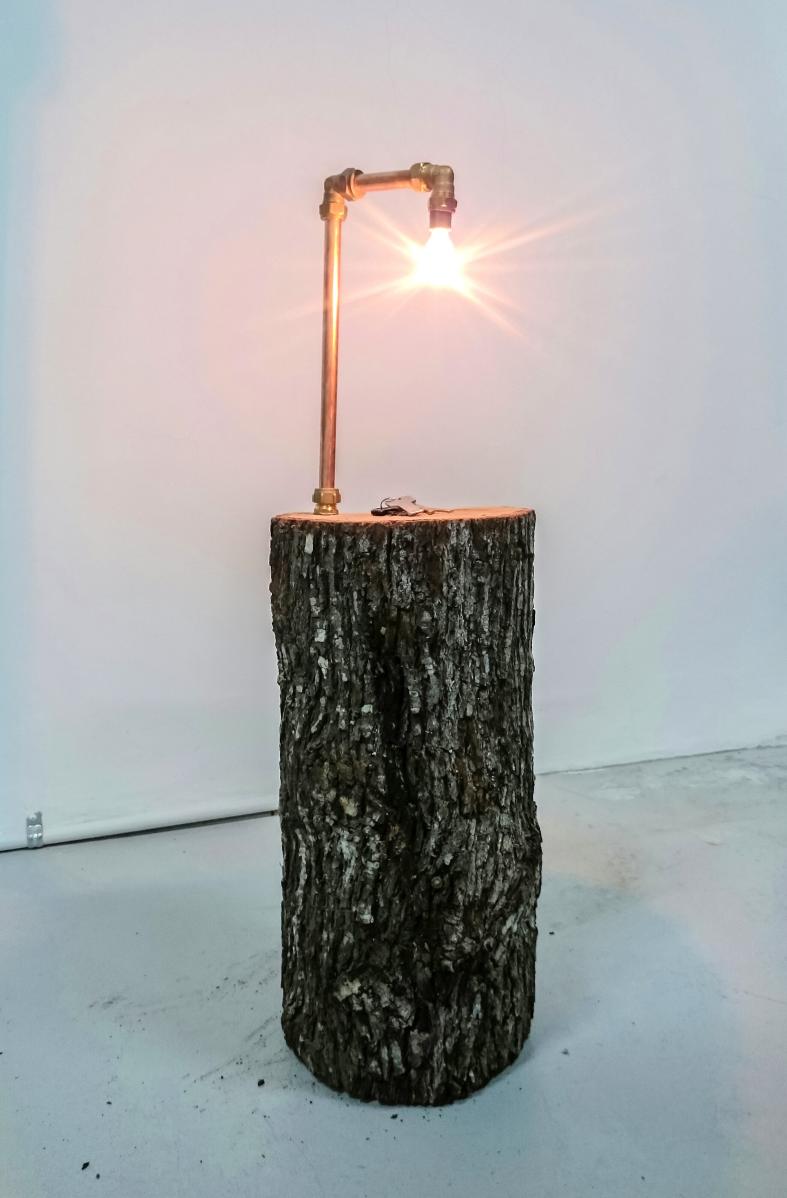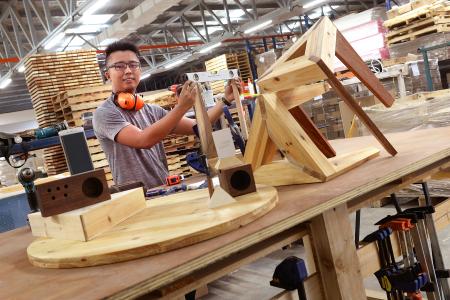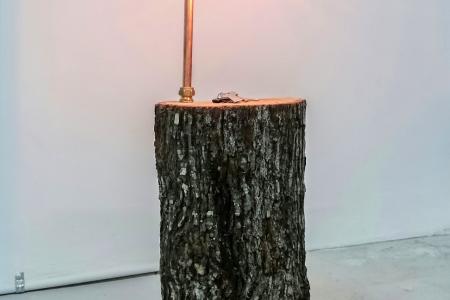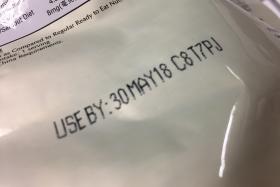He turns junk into bespoke furniture
More here are becoming upcycling converts, giving old and used items a new lease of life by turning them into new objects
It began life as a jewellery maker's worktable, but after Mr Jackie Tan installed a copper pipe and wiring, the block of wood found a second life as a nightstand.
This is just one of the many products Mr Jackie Tan, 28, has designed out of discarded or unwanted materials.
Some of the other products he has designed are triangular stools made from old wooden pallets and a leaning stool made from an Ikea table frame.
For Mr Tan, 28, this design process, known as upcycling, is all about ''giving a second chance to things that are ready to be discarded''.
His studio, Triple Eyelid, works with clients to design custom-made furniture based on materials the clients provide. These materials can range from beer crates to leftover marble slabs, cement or floor tiles.
Triple Eyelid started in 2014 after Mr Tan left his previous job as an interior designer. Mr Tan belongs to a growing group of upcycling enthusiasts here.
For him, the business was borne out of his love for the environment, which started when he was a student in Tasmania, Australia, pursuing a degree in Environmental Design.
''(Eco-consciousness) is a very common thing in their daily lives,'' he said.
''Everybody knows how to build. Everybody recycles and separates their trash.''

Hoping he could bring that mindset back to Singapore, he started Triple Eyelid.
With no tools of his own, Mr Tan walked around with a trolley, carting back what people discarded and turning them into his own creations.
One of his first projects was to turn discarded pieces of wooden pallets into a bed for his own office. He also turned wood into crates to organise his office.
Now, the studio is housed inside the workshop of Xcel Industrial Supplies, a company that supplies wooden pallets and packaging materials. They provide Triple Eyelid with reclaimed wood.
Mr Tan runs the company alone.
One of his greatest challenges, he said, was learning how to make the furniture itself.
''I didn't have a crafting background,'' he said. ''So it was a lot of trial and error.''
He encourages people who would like to try making upcycled products to first do research on the tools they need.
SCARED
Sometimes, people may get scared off by the concept of upcycled goods, said Mr Tan.
''A lot of people have the misconception that upcycled designs are trash-looking, or look like things that people throw away,'' he said.
But one glance at the clean, modern look of Triple Eyelid's products would clear that up.
Some products, such as a table made of Chengal wood and copper pipes, offers the unusual charm and harmony of wood and metal.
Besides making bespoke, upcycled furniture, Triple Eyelid also hosts workshops for people interested in upcycling their things at home.
Mr Tan uses these workshops to encourage others to be creative using whatever they have in their houses. ''If you make things well, you will treasure it more,'' he said.
Upcycled designs are trashlooking, or look like things that people throw away.
— Mr Jackie Tan on the mistaken belief people have about upcycled goods
Why throw when you can repair?

What do you do when a toy breaks?
Many would just throw it away.
A group led by 27-year-old Yusri Sapari, wants to change that mind set.
Repair Kopitiam is a free monthly event at Jurong and Tampines where the public can learn to fix broken items, be it household appliances, clothes, furniture or toys.
Mr Yusri told The New Paper: "Over the past 20 years, we have become a society that wants things more quickly. We don't have enough 'time' to repair our own things."
As he explained, repairing broken items not only saves money and the environment, it also gives you a sense of attachment to the item.
"(After repairing) you're not just a consumer. You're the owner of the item," he said.
One of the more common items that Mr Yusri shows his "students" to fix are standing fans.
For Mr Yusri, learning to repair his own things started when he was just a child.
"One of my first toys was my dad's toolbox," he said.
Repair Kopitiam is held every last Sunday of the month from 9am to 3pm. For details go to repairkopitiam.sg
(After repairing) you're not just a consumer. You're the owner of the item.
- Mr Yusri Sapari, who helps to organise monthly DIY event Repair Kopitiam
Get The New Paper on your phone with the free TNP app. Download from the Apple App Store or Google Play Store now



